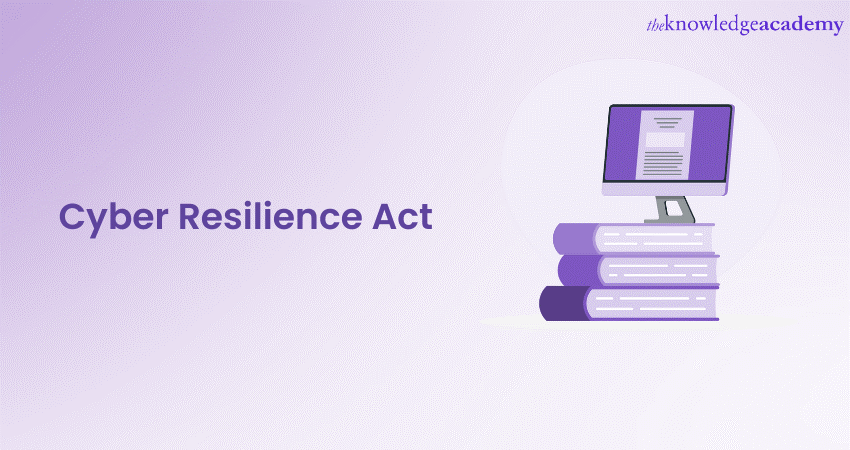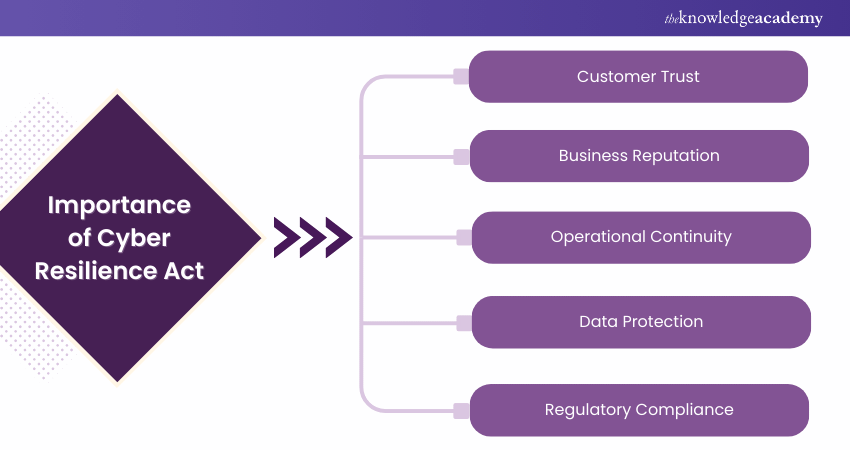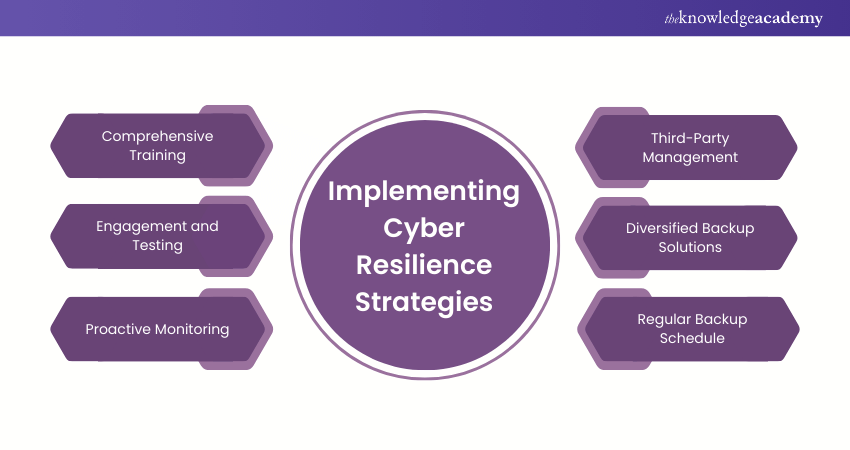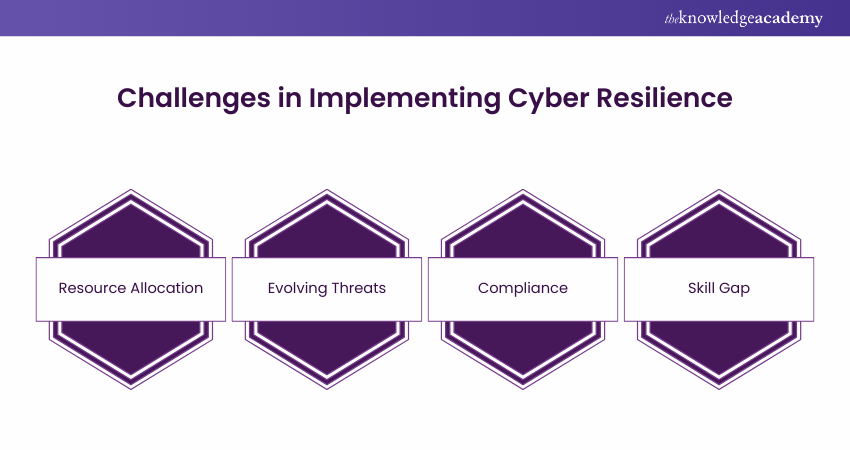We may not have the course you’re looking for. If you enquire or give us a call on + 1-866 272 8822 and speak to our training experts, we may still be able to help with your training requirements.
Training Outcomes Within Your Budget!
We ensure quality, budget-alignment, and timely delivery by our expert instructors.

In a world where digital threats persist, the Cyber Resilience Act stands as a beacon of protection. Picture a time when every tech gadget, from your wristwatch to the baby monitor, is safe from cyber dangers. This isn’t just a hope—it’s what the Cyber Resilience Act aims to achieve. This important law sets a new bar for cyber safety, requiring strong security from the start. It’s a big step forward, making sure that safety is a key part of every tech product. As we move forward in this digital age, understanding the Cyber Resilience Act is a must to protect our connected lives.
Table of Contents
1) Understanding the Cyber Resilience Act
2) Importance of Cyber Resilience
3) Components of the Cyber Resilience Act
4) Implementing Cyber Resilience Strategies
5) Challenges in Implementing Cyber Resilience
6) Entities Affected by the Cyber Resilience Act
7) Conclusion
Understanding the Cyber Resilience Act
The Cyber Resilience Act (CRA) is a proposed regulation by the European Commission to improve Cyber Security and resilience. The CRA mandates that manufacturers and retailers include robust Cyber Security features from the design phase and throughout the product’s lifecycle. This means that products connected to the internet need to meet these standards. The Act addresses the need for better security in digital products and the difficulty consumers and businesses face in determining which products are secure.
Importance of Cyber Resilience Act
Here are some of the key benefits:

a) Customer Trust: Cyber Resilience is fundamental in maintaining customer trust. When businesses can effectively handle cyber incidents, customers feel more secure in their transactions and interactions.
b) Business Reputation: A company’s reputation is its most valuable asset. Robust Cyber Resilience measures protect a business’s reputation by minimising the impact of cyber-attacks.
c) Operational Continuity: Cyber Resilience ensures that businesses can continue their operations with minimal disruption. This continuity is vital for maintaining service delivery and economic stability.
d) Data Protection: Protecting sensitive data is a key to Cyber Resilience. It prevents financial loss and protects individuals’ privacy in the event of a data breach.
e) Regulatory Compliance: Cyber Resilience helps entities comply with legal and regulatory requirements. Adherence to these standards can prevent costly penalties and legal issues.
Components of the Cyber Resilience Act
The Act consists of several key components:
Risk Assessment
Entities are required to conduct thorough risk assessments to identify potential cyber threats to their operations. This proactive approach helps in prioritising the risks and implementing appropriate measures to mitigate them. Regular risk assessments also adapt to the evolving nature of cyber threats, ensuring up-to-date defences.
Incident Response Plan
An effective plan is crucial for quick action in the event of a cyber incident. It outlines the procedures to follow, roles and responsibilities, and communication strategies to minimise damage. A well-practised incident response plan can significantly reduce the recovery time and costs associated with cyber-attacks.
Regular Audits
Regular audits are essential to verify that Cyber Resilience measures are properly implemented and effective. These audits assess compliance with the Act and help identify any gaps in the Cyber Security framework. Continuous improvement is facilitated through the insights gained from these audits, enhancing overall Cyber Resilience.
Reporting Obligations
The Act mandates that entities report significant cyber incidents to the authorities in a timely manner. This requirement shows that the authorities are aware of threats and can take necessary actions to prevent further damage. Reporting also contributes to a broader understanding of the cyber threat landscape, which can inform future legislation and protection measures.
Master Cyber Resilience with our RESILIA® Foundation and Practitioner Training – join today!
Implementing Cyber Resilience Strategies
To effectively implement Cyber Resilience strategies, entities should consider the following points:

a) Comprehensive Training: Develop a detailed Cyber Security training program that covers a wide range of topics, from password security to recognising phishing attempts.
b) Engagement and Testing: Engage employees with regular Cyber Security drills and tests to evaluate their understanding and readiness to respond to real-world cyber threats.
c) Proactive Monitoring: Implement proactive monitoring systems to automatically detect outdated software and initiate updates.
d) Third-Party Management: Ensure that third-party vendors and partners also adhere to strict Cyber Security practices, especially when they have access to your systems.
e) Diversified Backup Solutions: Use a combination of on-site and off-site backup solutions to ensure redundancy and availability of data in case of a cyber incident.
f) Regular Backup Schedule: Establish and maintain a regular backup schedule, ensuring that all critical data is backed up at frequent intervals.
Challenges in Implementing Cyber Resilience
Some challenges in implementing Cyber Resilience include:

a) Resource Allocation: Allocating enough resources for Cyber Security initiatives is often challenging due to budget constraints. It requires a strategic approach to justify the investment and demonstrate the long-term benefits of robust cyber defences.
b) Evolving Threats: Cyber threats are dynamic, with new vulnerabilities emerging as technology advances. Organisations must remain vigilant and update their Cyber Security measures regularly to counteract these evolving threats.
c) Compliance: Keeping up with the numerous regulations and standards in the Cyber Resilience Act can be challenging. Entities must have a clear understanding of the requirements and implement a compliance management system to ensure adherence.
d) Skill Gap: There is a major skill gap in the Cyber Security industry, with a shortage of qualified professionals to fill the roles. Organisations need to invest in training and development to build a skilled Cyber Security workforce or outsource to specialised service providers.
Empower your cyber defence with our RESILIA® Foundation Course – join today!
Entities Affected by the Cyber Resilience Act
The Act affects a wide range of entities, including:
a) Government Agencies: They must protect sensitive citizen data.
b) Businesses: From small startups to large corporations, all must secure their digital assets.
c) Healthcare Providers: They must safeguard patient information.
Conclusion
The Cyber Resilience Act is a vital move towards creating a safer digital world. By grasping and putting into action the Act’s rules, organisations can greatly improve their defences against cyber threats. This ensures not only their own safety but also secures the digital future for everyone.
Learn how to improve your organisation's Cyber Resilience with our RESILIA® Practitioner Course – join today!
Frequently Asked Questions

The key focus of the Cyber Resilience Act is to improve Cyber Security practices and ensure organisations are prepared to defend against and recover from cyber-attacks.

The Cyber Resilience Act applies to a wide range of entities, including government agencies, businesses, and organisations that handle sensitive information. It aims to ensure that these entities are taking steps to safeguard themselves against cyber threats.

The Knowledge Academy takes global learning to new heights, offering over 30,000 online courses across 490+ locations in 220 countries. This expansive reach ensures accessibility and convenience for learners worldwide.
Alongside our diverse Online Course Catalogue, encompassing 17 major categories, we go the extra mile by providing a plethora of free educational Online Resources like News updates, Blogs, videos, webinars, and interview questions. Tailoring learning experiences further, professionals can maximise value with customisable Course Bundles of TKA.

The Knowledge Academy’s Knowledge Pass, a prepaid voucher, adds another layer of flexibility, allowing course bookings over a 12-month period. Join us on a journey where education knows no bounds.

The Knowledge Academy offers various RESILIA® Training, including the RESILIA® Foundation and Practitioner Course and RESILIA® Foundation Course. These courses cater to different skill levels, providing comprehensive insights into Cyber Resilience vs Cyber Security.
Our IT Security & Data Protection Blogs cover a range of topics related to Cyber Resilience, offering valuable resources, best practices, and industry insights. Whether you are a beginner or looking to advance your cyber security skills, The Knowledge Academy's diverse courses and informative blogs have got you covered.
Upcoming IT Security & Data Protection Resources Batches & Dates
Date
 RESILIA® Foundation and Practitioner
RESILIA® Foundation and Practitioner
Mon 6th Jan 2025
Mon 17th Mar 2025
Mon 26th May 2025
Mon 14th Jul 2025
Mon 22nd Sep 2025
Mon 24th Nov 2025







 Top Rated Course
Top Rated Course



 If you wish to make any changes to your course, please
If you wish to make any changes to your course, please


